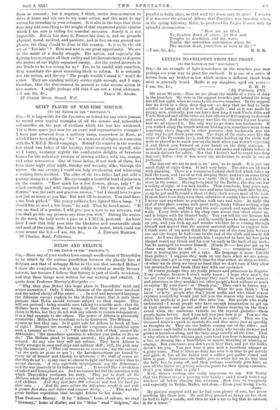MELOS AND BELGIUM. [To THE EDITOR OF THE "SPECTATOR."] SIR,—Have
any of your readers keen enough recollections of Thucydides to be struck by the curious parallelism between the ghastly fate of
Belgium and that of unhappy Melos in the war that wrecked Hellas ?
I draw the comparison, not in any coldly neutral or merely literary interest, but because I believe that history is part of God's revelation, and that these things were written for our warning and comfort. I
quote from Professor Murray's Euripides :— " Why then (has Melos) this large place in Thucydides' brief and severe narrative ? Only, I think, because of the moral issue involved and the naked clarity of the crime. . . . In cool and measured language tho Athenian envoys explain to the Mellen Senate that it suits their purpose that Melos should become subject to their empire. They will not pretend—being sensible men talking to sensible men—that the Melians have done them any wrong, or that they have any lawful claim to Melos, but they do not wish any islands to remain independent ; it is a bad example to the others. The power of Athens is practically irresistible ; Metes is free to submit or to be destroyed. The Melians . . answer as best they can. Is it quite safe for Athens to break all laws of right ? Empires are mortal ; and the vengeance of mankind upon such a tyranny as this . . ? 'We take the risk of that,' answer the Athenians ; 'the immediate question is whether you prefer to live or die.' The Melians plead to remain neutral ; the plea is, of course, refused. At any rate they will not submit. They know Athens is vastly stronger in men and ships and military skill ; still, the gods may help the innocent ; (` That risk causes us no uneasiness,' say the envoys ; 'we are quite as pious as you '); the Lacedaemonians are bound by every tie of honour and kinship to intervene (` We shall of course see that they do not ') ; in any ease we choose to fight and hope rather than to accept slavery. A very regrettable misjudgment,' say the Athenians : and the war proceeds to its hideous end. . . . It seemed like a revelation of naked and triumphant sin. And we cannot but feel the intention with which Thucydides continues his story. They put to death all the Me-liens whom they found of man's estate, and made slaves of the women and children. And they sent later 500 colonists and took the land for their own. . . . And the same winter the Athenians sought to sail with a greater fleet than ever before and conquer Sicily. . . .' This was the great Sicilian expedition that brought Athens to her doom."
Thus Professor Murray. If for "Athens," home of culture, we read "Germany," home of %tilts'', and for " Melos " read "Belgium," the parallel is fairly close, as God send the doom may be also ! I wonder if it was over the crime of Athens that Euripides was brooding when, in the spring following Meloa, he produced his Trojan Women with its splendid denunciation :— "How are ye blind, Ye treaders down of cities ; yo that cast Temples to desolation and lay waste Tombs, the untrodden sanctuaries where lie The ancient dead, yourselves so soon to die !


































 Previous page
Previous page